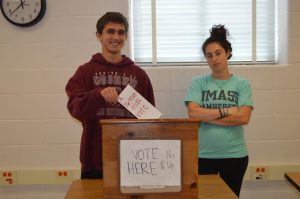Con: Voting Age
May 30, 2019
New legislation introduced to Congress by Rep. Ayanna Pressley (D-MA) in March 2019, proposing to lower the voting age in federal elections to 16 years old, needs to be rethought and redrafted as 16-year-olds are too young to be going to the polls. The voting age should not be lowered, rather energy should be invested into increasing voter turnout rather than increasing voter populations.
The teenage brain is fairly underdeveloped at 16 years old and continues to develop until the age of 25, forming neural connections and developing neuroplasticity, neuron transmissions and more efficient brain pathways.
For this very reason, teenagers simply are not developed enough to always think logically and reasonably.
Furthermore, historically, younger voters have the lowest voter turnout rates; therefore it needs to be considered whether it is worth lowering the age even further.
In the 2016 presidential election, only 41.6 percent of 18- to 29- year olds voted compared to 58.7 percent of 30- to 44-year olds, 66.6 percent of 45- to 64-year olds and 70.9 percent of those 65 years and older, according to the United States Census Bureau.
Teenagers are often preoccupied and overwhelmed with their own lives with sports, clubs, schoolwork and socializing. Teenagers are unlikely to even go to the polls nor increase voter rates.
Teenagers, furthermore, are often less cognizant of local and national issues. This is not to say they are ignorant or uncaring, but rather not as involved and informed.
A report on American teens’ knowledge of climate change conducted by the Yale Program on Climate Change Communication found that only 25 percent of teens successfully “passed” (received an A, B, or C), meaning they understood the causes and implications of global warming as well as how the climate system works.
This demonstrates how teens lack in-depth and effective knowledge on a key issue and campaign point, which is so often debated by politicians. If teens do not have an accurate view of certain important issues, it is unlikely they can understand the potential solutions or policies possible to address them.
While it is important to acknowledge that today’s teens are steadily becoming more involved in activism and politics, and starting to assert their power through protest, protesting on issues demonstrates passion yet does not always translate to knowledge on the issues. Allowing a few more years for that passion to develop into a better understanding of how policies may affect someone is needed.
Lowering the voting age is not the issue here; increasing voter turnout is, and teenagers still growing into themselves and the world should have a few more years until they cross the threshold into voting for the decisions that will directly impact themselves and the world around them.




